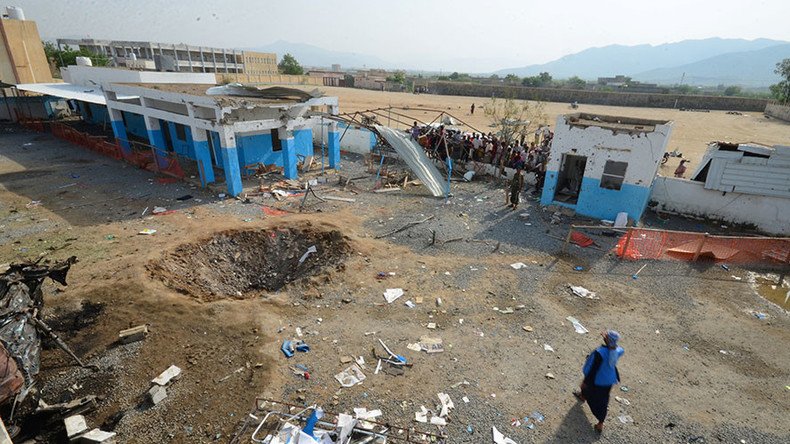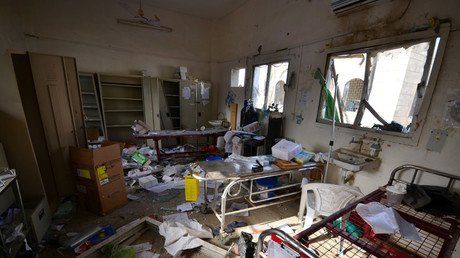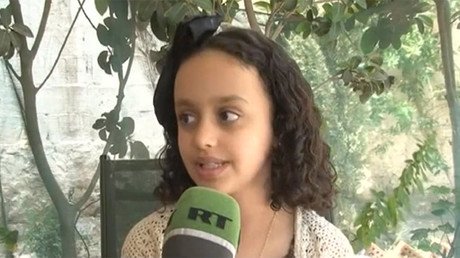‘Utter disregard for civilian life’: MSF slams Saudi airstrikes on Yemen hospitals

Saudi Arabia blatantly ignored the protected nature of medical facilities and demonstrated a total disregard for civilian life in Yemen when it executed indiscriminate and apparently intentional airstrikes on NGO-affiliated hospitals, MSF said in two new reports.
The reports by Doctors Without Borders (MSF) were released on Tuesday ahead of a UN Security Council closed session on the protection of medical missions. The attacks described in the reports were on the MSF clinic in the city of Taiz on December 2, 2015 and on a hospital in Abs, Hajjah governorate on August 15, 2016.
Ahead of UN Security Council, MSF releases reports on the Abs & Taiz incidents https://t.co/oT0pC8lF41#NotAtarget
— MSF International (@MSF) September 27, 2016
The reports state, that the both facilities had been operating strictly according to international rules, and “the neutrality of the hospital had not been compromised.”
“Ever since MSF began supporting the Abs hospital in July 2015 a strict no-weapons policy has been enforced at Abs hospital,” stated the report on the Abs hospital attack. “In addition to the security check at the entrance where all weapons, including jambiyas [traditional Yemeni swords], have to be left before accessing the facility, no military uniforms or vehicles are allowed on the premises.”
Military vehicles were permitted into the perimeter of the hospital only “in an event of a mass casualty plan,” but could not park at the territory or anywhere nearby. MSF were in contact with local forces to ensure mutual understanding of such precautions.
“The MSF Abs team has held regular meetings with local authorities and the Al-Houthi interlocutors on the ground to discuss the importance of maintaining the neutrality of the hospital and ensuring that the no-weapons policy would be respected at Abs. While relations with the Al-Houthi are difficult in many parts of the country, the team reported very fluent and uneventful communication with them in the Abs district,” states the report.
According to the reports, the hospitals were marked on all the maps, their locations were well-known and hospitals had all necessary markings and aerial designation signs. The report on Abs hospital attack calls Saudi-led coalition the perpetrator, since it’s “the only actor with military capability” to carry out an airstrike and “it was acknowledged by SLC military authorities minutes after during a telephone conversation with the MSF Djibouti liaison office.” The aim of attack, according to the report, was a car “that drove into the hospital compound roughly five minutes before the airstrike,” the car was destroyed in the process and the hospital was left badly damaged. The airstrike killed 19 people, including one MSF staff member, and injured 24 others.
“The attack disregarded the protected nature of the medical facility,” the report concludes.
The circumstances of the attack on the mobile MSF clinic were a bit different. According to the report, an MSF mother and child hospital was opened in November 2015. The mobile clinic was established in the vicinity of the hospital on 1 December 2015.
“The tented clinic was set up in an empty field in a residential neighborhood where many internally displaced people had gathered. MSF considered this location to be a safe and appropriate place for the clinic as there were no obvious potential military targets nearby. Moreover, there had been no airstrikes, nor any fighting in the area, in the months before the clinic was established,” the report reads.
The coordinates of the facility were known to the Saudi-led coalition. On December 2, heavy airstrikes begun in the vicinity of the hospital (1-4 km, according to the report). MSF contacted the coalition several times, re-checked coordinates, and was assured by their contact in Saudi army, that airstrikes were conducted 20km away from the location.
“Don’t worry, us are not going to approach these locations,” a Saudi army officer told MSF, according to the report.
Nevertheless, the mobile hospital was hit by warplanes an hour later.
“The airstrike injured nine people including a MSF health educator and the MSF guard. One of the wounded persons died of his injuries the following day.”
The report on Taiz hospital attack do not have any conclusions, besides stating that after “the airstrike a big part of the displaced population fled the area. In addition, the host community started to demand the displaced people leave the area, saying that it was because of them that MSF setup a clinic and that this led to the airstrike happening in the area. Most people are now displaced to Jabal Raimy and Al-Qahaaf.”
#Yemen 4 of our healthcare facilities were hit by airstrikes and shelling in the past year https://t.co/oT0pC843Fr#NotATargetpic.twitter.com/bwXpPQb3uS
— MSF International (@MSF) 27 сентября 2016 г.
MSF has worked in Yemen since 1994. An escalation in the conflict in early 2015 led to MSF scaling up its operations in the country. The MSF facilities have been targeted by the coalition four times since March 2015, and the recent attack caused MSF to withdraw medical staff from six hospitals in northern Yemen.
Before August 15, 2016, MSF had been working in 11 hospitals and health centers in Yemen and providing support to another 18 health centers with more than 2,000 MSF staff in the country, including 90 international staff.














